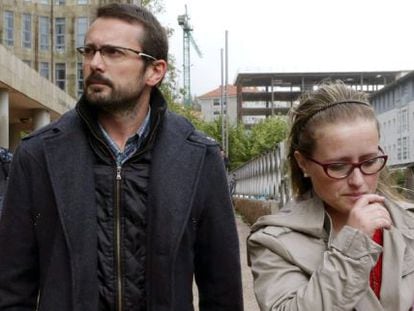“It makes me angry I have to die in secret, and alone”
With no euthanasia law in Spain, terminally ill José Antonio Arrabal committed suicide on April 2
On the morning of Sunday, April 2, José Antonio Arrabal sips the contents of two small bottles of medication through a straw. “It’s horrible,” he says with a grimace, speaking to the camera. The 58-year-old former electrician has been planning this moment for months, from the moment that the amyotrophic lateral sclerosis (ALS) he was diagnosed with in August 2015 began to take its toll. He has decided to film his final moments, and within a few seconds he will have ended his life.

Arrabal has had to make the preparations alone for fear of implicating his family in his suicide. In the apartment in the Madrid suburb of Alcobendas where he has lived for the last 30 years he has laid out his identity card, his medical history, his testament, a letter to the judge who will have to oversee his case, a letter donating his brain to medical science, and a sheet of paper where the words “Do not resuscitate” are written clearly.
In the video, it is clear that his movements are severely restricted by his condition – also known as Lou Gehrig’s disease – with his left hand now inert, but he has prepared things meticulously, purchasing medicines online that will first induce sleep, and then a heart attack.
The absence of a euthanasia law forces me to do this ahead of time José Antonio Arrabal
Over the last six weeks he has given two interviews to EL PAÍS, explaining his decision. Over that time he has been reading The Baztan Triology by Spanish best-selling author Dolores Redondo. “I’m 24% of the way through the third volume. I won’t have time to finish it,” he says to camera.
Arrabal explains that he was clear about ending his own life as soon as he was diagnosed with ALS. “I looked into it and saw what was waiting for me: ending up as a vegetable,” he said on February 10, when he was already losing the use of his right hand. On his last day, he is still moving it, as though checking that he will be able to take the medication unassisted.
He says he became aware in October 2016 that his condition was deteriorating more quickly. He was no longer able to paint, and had to buy a new ebook that was simpler for his increasingly unresponsive hands to use. “I now need help to turn over in bed, to dress, to undress, to eat, to wash myself. I can only drink with a straw from a plastic cup because I can’t hold a glass,” he explains in his video. He also needs help to breathe, “particularly at night.”
“All that is left for me is to end up as a vegetable, and I have always been very independent. I don’t want my wife and my children to have to mortgage their lives looking after me for no reason,” says Arrabal, who rejected the option of traveling to Switzerland, where assisted suicide is permitted, to end his life because of the €12,000 cost.
I’m taking a risk here. I have had to buy the medication online, and there are no guarantees José Antonio Arrabal
He has chosen the day to end his life carefully: his wife and one of his children go swimming on Sunday mornings, the other son is spending the weekend at a friend’s house. “I told them to take their time, so that everything is over,” he explains. One of the reasons he has filmed his suicide is to remove any doubt that they were involved. “Nobody can accuse them of collaborating in a suicide,” he says.
Arrabal says that if Spain allowed assisted suicide and euthanasia he could have put off his death longer: petition website Change.org has so far garnered 9,000 signatures in support of such a law. “I would have stuck it out longer. But I want to be able to decide the end. And the way things are offers me no guarantees,” he explains, his anger stifled, perhaps due to his breathing difficulties.
“The truth is that it is sad that there is no law to regulate these things. I’m taking a risk here. I have had to buy the medication online, and there are no guarantees.”
The alternative would have been terminal sedation, whereby people suffering from terminal illnesses are sedated to relieve pain or other symptoms, even if this brings on an early death.
He says he rejected this option from the outset. “That comes right at the end, and until then, I have to be looked after.” He also points out that the matter is out of his hands: the doctors decide at what point pain or suffering is no longer bearable; they apply the sedation based on their criteria. “That’s why I have to bring on my death at an earlier stage. It makes me angry to have to do it in secret, alone. The absence of a euthanasia law forces me to do this ahead of time.”
Arrabal’s video shows him taking his medication and then trying to read, but within a few seconds the sedative starts to take effect. Leaning back into his chair, he bids farewell: “Goodbye everybody.” He closes his eyes, never to open them again.
English version by Nick Lyne.












































